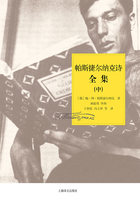DURING the weeks that followed,some malignant spirit seemed to be torturing him with a slow realization of all he had lost;taunting him with the possibility of regaining it and the certainty of losing it forever.
As he stepped from the dock at Jersey City the fresh sea wind had thrilled him like a memory,and his pulses leaped instantly into sympathy with the tense life that vibrated in the air.He seemed never to have been away so long,and never had home seemed so pleasant.His sister had grown more beautiful;his mother's quiet,noble face was smoother and fairer than it had been for years;and despite the absence of his father,who had been hastily summoned to England,there was an air of cheerfulness in the house that was in marked contrast to its gloom when Clayton was last at home.
He had been quickened at once into a new appreciation of the luxury and refinement about him,and he soon began to wonder how he had inured himself to the discomforts and crudities of his mountain life.Old habits easily resumed sway over him.
At the club friend and acquaintance were so unfeignedly glad to see him that he began to suspect that his own inner gloom had darkened their faces after his father's misfortune.Day after day found him in his favorite corner at the club,watching the passing pageant and listening eagerly to the conversational froth of the town-the gossip of club,theatre,and society.His ascetic life in the mountains gave to every pleasure the taste of inexperience.His early youth seemed renewed,so keen and fresh were his emotions.He felt,too,that he was recovering a lost identity,and still the new one that had grown around him would not loosen its hold.He had told his family nothing of Easter-why,he could scarcely have said-and the difficulty of telling increased each day.
His secret began to weigh heavily upon him;and though he determined to unburden himself on his father's return,he was troubled with a vague sense of deception.When he went to receptions with his sister,this sense of a double identity was keenly felt amid the lights,the music,the flowers,the flash of eyes and white necks and arms,the low voices,the polite,clear-cut utterances of welcome and compliment.
Several times he had met a face for which he had once had a boyish infatuation.Its image had never been supplanted during his student career,but he had turned from it as from a star when he came home and found that his life was to be built with his own hands.Now the girl had grown to gracious womanhood,and when he saw her he was thrilled with the remembrance that she had once favored him above all others.One night a desire assailed him to learn upon what footing he then stood.He had yielded,and she gave him a kindly welcome.They had drifted to reminiscence,and Clayton went home that night troubled at heart and angry that he should be so easily disturbed;surprised that the days were passing so swiftly,and pained that they were filled less and less with thoughts of Easter.With a pang of remorse and fear,he determined to go back to the mountains as soon as his father came home.He knew the effect of habit.He would forget these pleasures felt so keenly now,as he had once forgotten them,and he would leave before their hold upon him was secure.
Knowing the danger that beset him,Puritan that he was,he had avoided it all he could.He even stopped his daily visits to the club,and spent most of his time at home with his mother and sister.Once only,to his bitter regret,was he induced to go out.
Wagner's tidal wave had reached New York;it was the opening night of the season,and the opera was one that he had learned to love in Germany.The very brilliancy of the scene threw him into gloom,so aloof did he feel from it all-the great theatre aflame with lights,the circling tiers of faces,the pit with its hundred musicians,their eyes on the leader,who stood above them with baton upraised and German face already aglow.













